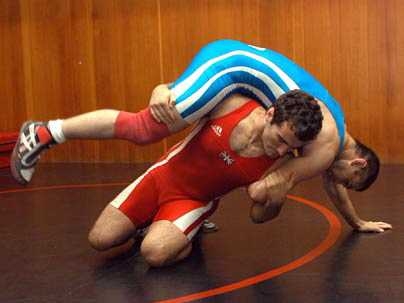MIT mathematician Nate Ackerman will offer proof that scientists can combine brain and brawn as he competes in the summer Olympics with the top wrestlers in the world. The 26-year-old graduate student is the British national champion.
While in Athens, he may pass by the interactive art installation of light and sound, "White Noise/White Light," designed by MIT professor of architecture J. Meejin Yoon. Or maybe he'll see alumnus Steve Tucker (S.B. 1991) row with the USA oarsmen, MIT coach Omar Amr compete with the USA water polo team, and alumnus Chinedum Osuji (Ph.D. 2003) fight on the Trinidad and Tobago taekwondo team.
They'll all arrive at the Athens airport, where authorities are being advised by Amedeo Odoni, an MIT professor of aeronautics and astronautics and civil and environmental engineering who is an expert in airport planning and operations. At the games, they'll see the Olympic torch, which was carried in Istanbul on July 6 by alumnus Bilge Demirköz (S.B. 2001, S.M.). Organizers selected Demirköz, a physicist, because they wanted scientists to be among the 130 or so torch bearers to carry the flame through the largest city of her native country.
Ackerman himself holds dual citizenship--U.S. (he was born in New York City) and British--but chose to wrestle for Britain because he wrestled there during high school, and because the competition in U.S. freestyle is "much, much, much more difficult," he said. For instance, Joe Williams, the three time NCAA wrestling champ, is in the same weight class (74 kg) as Ackerman.
Ackerman fell in love with mathematics when he was in the 5th grade, three years before he discovered wrestling. He remembers working out math ideas in his head on the elementary school playground and decided early on to pursue that love. "If I had devoted my life to wrestling and not math, and gone to Minsk or Moscow to train, I probably would be a better wrestler," he said.
His family moved from the U.S. to London when he was 12. There, at the American School, he started wrestling when his rugby coach noticed he enjoyed the scrums more than the running, and suggested Ackerman try the other sport. "I didn't win a single match my first year, but I just kept at it," said Ackerman. He's been the British national champion twice, in 2004 and 2002.
"Wrestling is like athletic speed chess," said Ackerman, whose instinct for theoretical mathematics may help him plan out his wrestling moves during a match, although he claims there is no overlap.
Wrestling does help him make his way socially, though. "I can talk to my math friends about wrestling, but I can't talk to my wrestling friends about my math thesis," he said. His area of mathematics is probably the most abstract there is: "foundational math" or logistics uses mathematical methods to study mathematics itself. He says that much of the stuff is so abstract it almost doesn't have anything to do with some branches of math.
"Mathematicians study what interests them in mathematics and just assume the foundations are there and can be worked out if they need them," said Ackerman. "We [foundational mathematicians] study the foundations." For his Ph.D., he's generalizing the work of a British mathematician, Robin Knight, who solved Vaught's conjecture (an old, open mathematics question) a few years ago. "His work is incredibly complicated. It took me about 10 months to read it and decide it was right," said Ackerman, who devotes about 20 hours a week to wrestling.
Olympic wrestling is scheduled to begin Aug. 22. Until then, Ackerman will continue training at a facility near Minsk, Russia, with Granit Taropin, a former Soviet wrestling coach. The young mathematician knows he'll be competing against the best in the world, but he's used to that.






